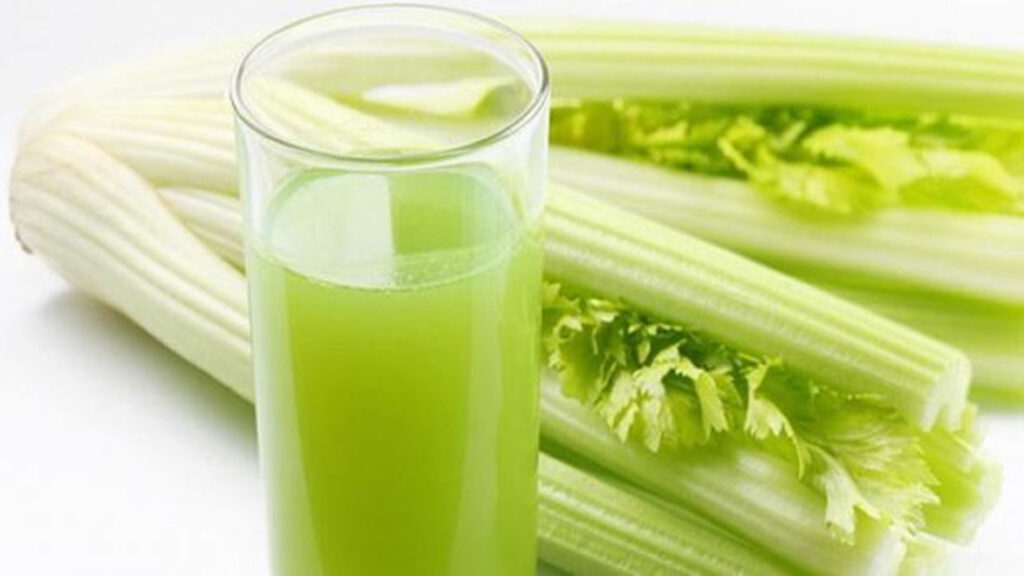Celery relates to the Umbelliferae family and is a very nutritious vegetable that can be of two varieties, white and green. It can grow to the height of up to 16 inches, and its ribs are crunchy and salty.
Celery is a magnificent source of fiber, and its leaves are rich in vitamin A. Also, the stems are abundant in potassium, calcium, magnesium, sodium, iron, phosphorus, vitamins B1, B2, B6 and C, and numerous essential amino acids.

A cup of chopped, raw celery (about 101 grams) contains:
- 16.2 calories
- 3.5 grams carbohydrates
- 0.7 gram protein
- 0.2 gram fat
- 1.6 grams fiber
- 29.6 micrograms vitamin K (37 percent DV)
- 453 international units (9 percent DV)
- 263 milligrams potassium (8 percent DV)
- 3.1 milligrams vitamin C (5 percent DV)
- 36.5 micrograms folate (9 percent DV)
- 40.4 milligrams calcium (4 percent DV)
- 0.1 milligram riboflavin (3 percent DV)
- 11.1 milligrams magnesium (3 percent DV)
- 0.1 milligram manganese (5 percent DV)
- 0.1 milligram vitamin B6 (4 percent DV)
As well as vitamin E, niacin, pantothenic acid, iron, phosphorus, zinc and selenium.
When it comes to the antioxidant nutrients it holds, it is important to mention that celery is rich in phytonutrients, many of which fall into the category of phenolic antioxidants and have strong anti-inflammatory benefits:
— Phenolic acids
- caffeic acid
- caffeoylquinic acid
- cinnamic acid
- coumaric acid
- ferulic acid
— Flavones
- apigenin
- luteolin
— Flavonols
- quercetin
- kaempferol
— Dihydrostilbenoids
- lunularin
— Phytosterols
- beta-sitosterol
— Furanocoumarins
- bergapten
- psoralen
Table of Contents
Researches have found that celery improves health in various ways, as follows:
- Celery juice rehydrates the body and gives high electrolyte levels, so it is great after a workout;
- Celery juice lowers total cholesterol and LDL (bad) cholesterol;
- It holds at least 8 families of anti-cancer compounds, including acetylenics, which prevent the growth of tumor cells, phenolic acids, which inhibit the action of prostaglandins that stimulate the growth of tumor cells, and coumarins which block free radical damage
- Celery juice is abundant in minerals that control the pH levels of the blood and neutralize acidity;
- The organic sodium in celery lowers blood pressure, while the phthalides it holds relax the muscles around arteries and improve blood flow;
- Celery has natural laxative effects that treat constipation;
- Celery juice is loaded in sodium and potassium that stimulates the production of urine and prevent water retention;
- Celery juice suppresses appetite and promotes weight loss;
- The consumption of celery juice during dry and hot weather will normalize body temperature and cool your body;
- The polyacetylene in celery fights inflammation and manages rheumatoid arthritis, osteoarthritis, gout, asthma, and bronchitis;
- Celery detoxifies the body and stops the formation of kidney stones;
- Celery juice effectively eliminates gallbladder and urinary stones;
- Celery soothes the nervous system and treats insomnia;
- Celery juice is abundant in flavones that lower blood sugar levels and prevent sugar spikes.
When buying celery, prefer green celery, due to the chlorophyll they contain, and pick the firm ribs. Keep celery in a sealed container or wrap in a plastic bag, in the fridge.
Note that if the consumption of celery causes skin issues, you might be sensitive to psoralen, the protective layer of this vegetable.
To collect all the benefits of celery and treat hypertension, prepare the following juice at home and drink a few glasses of it daily:
Ingredients:
- A whole stalk of celery (about 12-16 ribs)
- ½ lemon
- 1-inch ginger root
- 1 cucumber
- 2 green apples
Instructions:
Wash the ingredients, cut them, and juice them together in the juicer. Enjoy!
Sources:
healthyfoodhouse.com
juicing-for-health.com
www.whfoods.comdraxe.com
